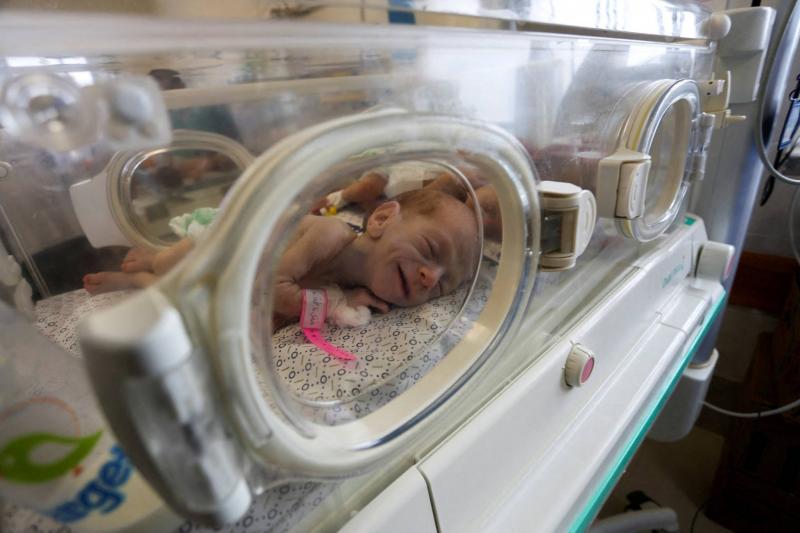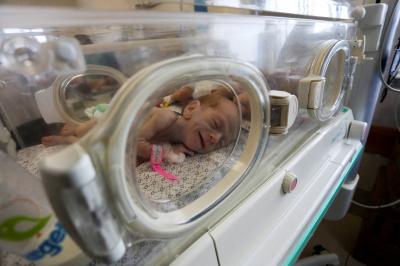A premature baby girl, born just before the outbreak of war in Gaza, received treatment at Al-Shifa Hospital until it became non-operational, separating her from her displaced family before being transferred to Egypt on Monday with her mother and 27 other Palestinian newborns. Lubna Al-Sek, the baby's mother, was one of the few mothers accompanying the 28 premature babies as they were transported in a convoy of ambulances from a hospital in southern Gaza through the Rafah border crossing to Egypt for treatment.
Live footage broadcasted by Cairo News Channel showed medical staff carefully lifting small children from an ambulance and placing them in portable incubators, then pushing them across a parking lot towards other ambulances.
On Sunday, 31 children were transferred from the besieged Al-Shifa Hospital in Gaza City to a maternity hospital in Rafah, wearing only diapers and small green caps, before being moved to Egyptian hospitals. Dr. Rick Brennan from the World Health Organization stated in an interview with Reuters in Cairo, "Of these 31 children, 11 or 12 are in critical condition, and the rest are all serious." He added, "They all suffer from severe infections, and a few are experiencing hypothermia, and thus they really need integrated specialized care."
The Director-General of the World Health Organization, Tedros Adhanom Ghebreyesus, said that 12 of the children were airlifted to Cairo. The plight of the newborns has garnered global attention since images surfaced eight days ago showing them lying side by side in beds at Al-Shifa Hospital after their incubators shut down due to power outages caused by fuel shortages amid the Israeli military assault on Gaza City.
When doctors at Al-Shifa Hospital issued warnings about the newborns, the number was 39. Eight of them have since died. Al-Sek's story, along with those of her daughter, whose name remains undisclosed, provided some of the first personal details about these premature infants.
Al-Sek explained that just before the outbreak of war, her baby was receiving oxygen at Al-Shifa Hospital due to breathing difficulties following her premature birth. The family left their home on the third day of the war to escape the Israeli bombardment. Like hundreds of thousands of others, the Al-Sek family moved to southern Gaza with their three other children while the baby remained at Al-Shifa Hospital.
Given the shortages of electricity, water, medicine, and other essentials, conditions at Al-Shifa Hospital deteriorated, leading to the baby losing weight and falling ill. Al-Sek stated, "In the ten days of the hospital siege, there was no milk provided for them, and the baby's condition worsened, returning to square one in that she was living on oxygen."
The mother was reunited with her baby in Rafah. She noted that to accompany her daughter to Egypt, she had to leave her other children behind in Gaza.
Jeremy Hopkins, representative for UNICEF in Egypt, told Reuters that the organization is working with the Egyptian authorities to understand the conditions of each child, including those without relatives, to provide support extending beyond direct medical care.
Dr. Mohamed Salama, head of the neonatal care unit at the UAE Hospital in Rafah, where the children spent the previous night, stated that three of the children remained in stable condition. He added, "The children arrived here from Al-Shifa Hospital and were in critical condition upon arrival." He told Reuters via phone, "Some suffered from malnutrition, others from dehydration, and others from low temperatures. We worked to stabilize their conditions over the past 24 hours."
He continued, "As soon as we received the call to prepare the children, we got them ready for transport." Salama explained that some children were with their mothers, while others were without relatives but accompanied by paramedics. In cases where mothers were deceased or missing, other relatives signed consent forms for the transfer.




